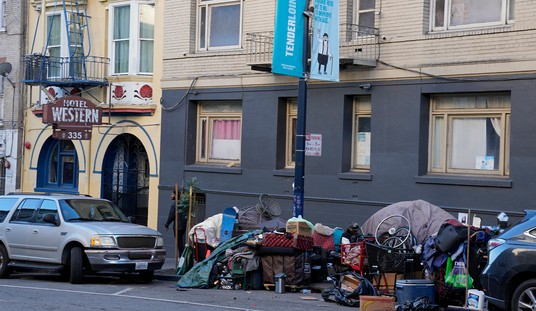A fiendishly clever theory from Peter Beinart. Remember “Operation Chaos”? That was Rush Limbaugh’s plan to have GOP voters wreak havoc on the Democratic nominating process in 2008. With McCain’s nomination already all but assured and Obama clinging to an apparently insurmountable lead over Hillary, Rush encouraged Republicans in states with open primaries (i.e. states where you don’t have to be registered as a party member to vote in that party’s primary) to cross over and vote for Hillary in the Democratic primary instead. The idea was to drag the primary process out for Democrats as long as possible, forcing O to keep campaigning to protect his lead and encouraging further bloodletting between Obama and Clinton.
Fast-forward eight years. Assuming Hillary waltzes to the nomination in 2016 while the GOP primary is as competitive as everyone expects, it’ll be Democratic voters who’ll have nothing to lose by crossing over and voting in the other team’s primary. And who’s likely to benefit from that, Beinart asks?
When it comes to government’s role in the economy, Paul’s views are diametrically opposed to most Democrats and Democratic-leaning independents. But that will be true of his major opponents too. What distinguishes Paul is that on some high-profile issues—government spying, military intervention, prison sentences—he espouses views that many Democrats find not only agreeable, but downright exciting. On NSA surveillance, for instance, Paul probably better represents the views of many grassroots liberal activists than do many Washington Democrats. Paul is more reluctant to send American troops into harm’s way than Hillary Clinton. The recently discovered speech in which he suggested Dick Cheney pushed for the Iraq War so that Halliburton would profit.
If liberals don’t know that Paul holds these views now, they will by 2016. With the Democratic primary campaign a snooze, the press will devote massive attention to the GOP race. And Paul’s Republican opponents will mercilessly attack him for his unorthodox national-security views, thus likely winning him even more sympathy among liberal Democrats and Independents.
The best model for all this is 2000 when John McCain—although a conventional Republican on many issues—titillated Democrats with his crusade for campaign-finance reform and his criticism of George W. Bush’s plan for to cut taxes for the rich. The more the GOP establishment demonized McCain, the more Democrats and liberal independents figured he must be doing something right. Independents comprised almost a third of the voters in the New Hampshire primary that year, and they favored McCain over Bush by 42 points.
As the most left-leaning candidate in the GOP field on social issues and civil liberties, Paul’s a natural choice for Democrats who are bored with their own primary. There’ll also be other Democrats who cross over to vote for him (and probably for Cruz) for purely strategic reasons, because they’re convinced that a right-wing ideologue will be the easiest candidate for Hillary to beat in the general election. Regardless of motive, Paul himself will eat this up because it plays directly into his big theme of the past year, that Republicans need to grow the party and win votes from constituencies who typically ignore them. If he squeaks to a huge win in New Hampshire or South Carolina (both of which have open primaries) and exit polls show a significant share of his vote came from Democrats, he’ll tout it as proof that he’s doing exactly what he said he’d do. He grew the party. He got voters across the aisle excited enough to vote for him in a Republican primary. Some of them will surely stick with him for the general election. Right?
A few questions, though. One: Given the roundhouses that Rand’s been throwing at Bill Clinton, how many Hillary fans will refuse to vote for him on principle? I think Paul’s concluded that one way he can impress conservatives who are trying to choose between him and Cruz is to get out in front on scrapping with the Clintons. It raises his visibility and signals that he’d be a fighter as a nominee. If that’s true, then he’s sure to attack both of them more often over the next 15 months. Hillary supporters will notice and that’ll make it harder to pull the lever for him, even for strategic reasons.
Two: Personally, if the GOP primary were meaningless, I might consider voting for someone in the Democratic primary only if I thought he/she stood a fair chance of winning the general election. There’d be strategic value in that since I’d be helping to narrow the options to lead the country in a way that excludes outcomes that are less acceptable to me. If, however, I were convinced that the Democrat I’m inclined to vote for has little chance of being elected, I wouldn’t bother voting at all. Why waste the vote? In that case, I’m better off voting for the weakest Democrat in the field to make it easier for the GOP in the general. Point being, it’ll be conventional wisdom among both Democrats and many Republicans come 2016 that Paul, if nominated, simply cannot win. Beinart himself describes Paul as a right-wing McGovern in the making. If you’re a Democrat voting in an open GOP primary, you might vote for him for that reason, that he’s a patsy. But why would you drag yourself down to the polling place to vote for the most left-ish candidate in a right-wing group if you also think he’s unelectable? I think Beinart’s theory is likelier to play out as a true Operation Chaos, with Dems voting strategically, than them voting for Paul in earnest.
Three: All of this depends on how long Democrats wait before they set about trying to destroy Paul. Do they wait until he’s the nominee or do they start earlier to prepare the ground for the scorched-earth campaign to come? Everything in presidential politics starts earlier these days; the stronger Paul looks next fall, before anyone’s voted, the more tempted Democrats will be to unfurl their anti-Paul narrative — he’s a neo-confederate, he wants to destroy the welfare state, he wants to eliminate workplace protections, he won’t defend the country, and on and on. Democratic voters will be getting a steady diet of this before, I think, the first caucuses in Iowa open. That being so, how many rank-and-file Dems will be eager to cross over for him? And bear in mind, at the same time Democratic groups are attacking him, Paul himself will be busy trying to sell himself as a fairly orthodox conservative to mainstream righties, which means downplaying some of those libertarian social impulses that Democrats find appealing. Doesn’t mean Beinart’s totally wrong — Paul will get votes from indies and Democrats — but is the crossover effect enough to prove decisive? I wonder.








Join the conversation as a VIP Member